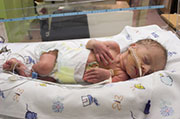- Could Your Grocery Store Meat Be Causing Recurring UTIs?
- Are You Making This Expensive Thermostat Error This Winter?
- Recognizing the Signs of Hypothyroidism
- 10 Strategies to Overcome Insomnia
- Could Artificial Sweeteners Be Aging the Brain Faster?
- Techniques for Soothing Your Nervous System
- Does the Water in Your House Smell Funny? Here’s Why
- Can a Daily Dose of Apple Cider Vinegar Actually Aid Weight Loss?
- 6 Health Beverages That Can Actually Spike Your Blood Sugar
- Treatment Options for Social Anxiety Disorder
Preemies’ Thinking Skills May Catch Up by Adolescence


A new Australian study offers some potentially reassuring news to parents of preemies who are worried about their child’s intellectual development: By adolescence, many of these infants appear to catch up to classmates who weren’t born early.
But some U.S. experts said the findings may be overly optimistic because only the healthiest premature babies were studied.
Premature infants are born more than three weeks before their due date, but brain volume typically doubles in those final weeks before birth, explained Dr. Deborah Campbell, chief of neonatology at Children’s Hospital at Montefiore in New York City. “There is tremendous growth and activity in that last month,” she said.
Without that time in the womb for the brain to develop normally, preemies can experience a wide range of issues, including thinking and memory problems. “Fifty percent of preemies will have learning problems,” said Campbell.
The Australian researchers found the strongest predictors of thinking ability in teenagers who were born prematurely seemed to be a combination of factors that occurred both before and after birth, most particularly birth weight, height and socioeconomic level at the time of birth.
Of those factors, early nutrition and enrichment through physical and intellectual stimulation in the home environment are likely to have key roles, the study authors concluded. The research was published recently in The Journal of Pediatrics.
For the study, Luke Schneider and colleagues at the University of Adelaide looked at 145 adolescents who were born prematurely: 78 boys and 67 girls. Gestational age — which is normally 40 to 42 weeks — ranged from 25 to 41 weeks. None of the participants had abnormal brain ultrasounds at birth, any genetic or chromosomal disorder or known syndrome, or any physical or intellectual disability that would interfere with their ability to follow directions.
Data related to gestational age at birth, each teenager’s birth weight and current height and weight, birth head circumference and socioeconomic level (based on their address at birth and parents’ occupation, employment and income) were also collected. The thinking abilities of the teenagers were then assessed using standard tests.
The researchers noted that the only extremely preterm children who were included in the study were those with good fetal growth at the time of their birth. As a result, they said that the sample may not be representative of all preterm children, only the most neurologically normal.
One expert agreed that the research may not reflect the full spectrum of preemies.
“This is an abnormally rosy picture of preterm birth,” said Dr. Catherine Herway, an assistant director of maternal-fetal medicine at Staten Island University Hospital, in New York City.
Herway added that she was concerned that research suggesting that problems of prematurity may be resolved by adolescence may fuel a current trend where women are asking that their babies be delivered a couple of weeks before their due date.
“The number one reason is that women are tired of being pregnant, don’t like their swollen feet or the back pain, and I don’t blame them. But it’s a choice of putting up with the discomfort for the lifelong health of your child,” Herway said.
Neither Campbell nor Herway were involved in the study.
Campbell encouraged parents of preemies to monitor their children’s development and make sure they are meeting the appropriate milestones. “It’s not about money,” she said. “Anyone can create different developmental stimuli, can talk to their children and introduce them to the world.”
Yet, even with careful parental support, prematurity is a lifelong health risk, said Campbell. Adults who were preemies may have a higher risk of upper respiratory issues and metabolic syndrome, a combination of physiological abnormalities that increase the risk of cardiovascular disease and type 2 diabetes, she explained.
Adults who were preemies can also experience thinking challenges. On average, intellectual potential will be slightly diminished, Campbell explained. “If your genetic potential was supposed to be an IQ of 120, it would be about 110, depending on how little you were when you were born and how sick you were,” she said.
Herway said more studies are needed to better understand the long-term outcomes of prematurity.
“Sometimes we see kids born at 26 weeks and they’re totally normal,” Herway said. “It’s multi-factorial and we really don’t understand it.”
More information
Learn more about prematurity from the U.S. National Library of Medicine.
Source: HealthDay
Copyright © 2026 HealthDay. All rights reserved.










